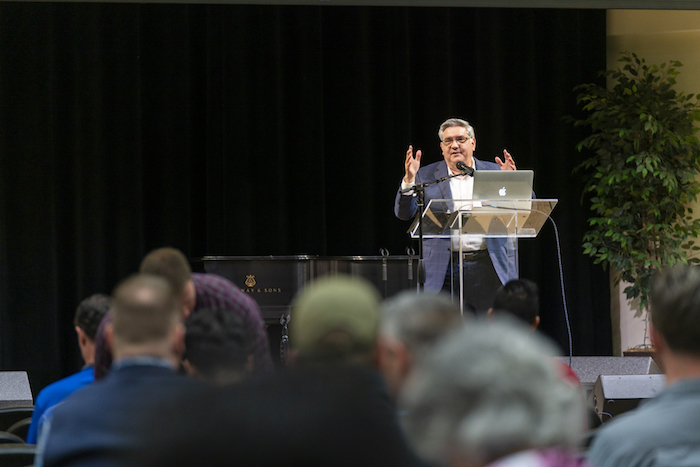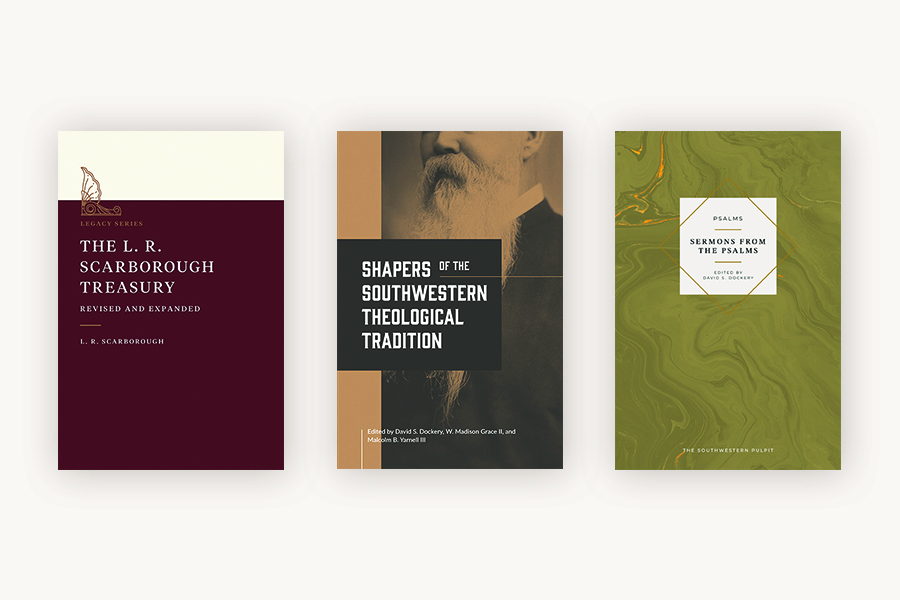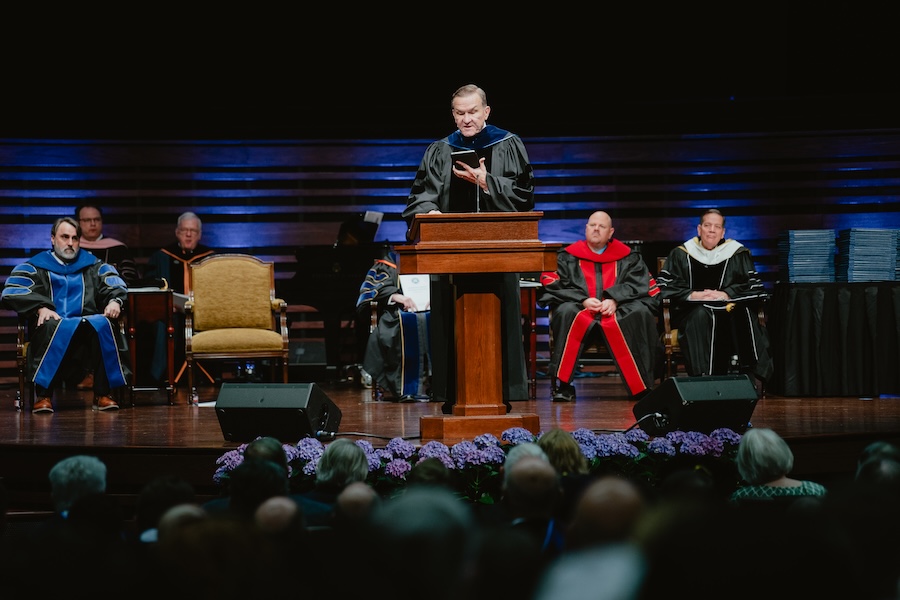Pastors urged to ‘truly impact eternity’ at annual preaching conference

“Over the course of these last couple of days, you’ve heard some of the finest preachers that we could bring together here on the campus of Southwestern Seminary and Scarborough College,” said President Adam W. Greenway during the closing session of the fourth annual Text-Driven Preaching Conference at The Southwestern Baptist Theological Seminary, March 2-3.
“Every one of them a powerful expositor; every one of them a personal evangelist,” Greenway continued. “And together with them, I say to you: Dear pastor, preach the Word. Dear pastor, live the Word. Allow God to use you to make a difference that will not only touch your world, but will truly impact eternity.”
Hosted by Southwestern Seminary’s School of Preaching, the conference featured six plenary sessions, 66 breakout sessions (including tracks in Korean and Spanish), a pre-conference, a lunch sponsored by LifeWay Christian Resources, and a late-night panel discussion—all focused on equipping pastors and church leaders in the art of text-driven preaching.
Dean of the School of Preaching David Allen led the conference’s first plenary session, preaching on Hebrews 12.
In his message on the call for endurance in the Christian life, Allen noted that it has always been and always will be difficult to live for Christ, but Christians must do so by pressing on.
“God is not so much interested in your perfection as He is interested in your progression,” Allen said.
Allen noted the Scripture’s direct command to “let us run with endurance the race that has been set before us.” This command, he said, is the very picture of the Christian life and is key to the point of the text.
Christians do this, Allen said, by following what is then directed in verse 2, to “lay aside every hindrance” and sin, and by keeping their eyes fixed on Jesus Christ.
“The problem with so many of us in our Christian life is that we have our eyes in any number of places other than where they ought to be,” Allen said. “We are distracted beyond measure. And we are stumbling along blindly in the Christian’s marathon, because we don’t have our eyes fixed on Jesus.”
In conclusion, Allen said, it is important not only to have started the “race,” but to finish well.
“The Savior of our souls did not send you the gift of salvation or the ministry to which He has called you so that you could start but not finish,” Allen said. “He has called you to finish. And one day, your goal should be to cross the finish line and fall into His arms and long to hear these words from His lips, ‘Well done, good and faithful servant.’”
During the second plenary session, conference attendees heard from Juan Sanchez, senior pastor of High Pointe Baptist Church in Austin, Texas.
Preaching on Ruth 3, Sanchez said that both pastors and everyday Christians crave comfort and are afraid of risk in their lives and churches. He challenged conference attendees to be leaders and church members who are not afraid of what is difficult, and to pursue “faith-fueled strategic planning and risk-taking ministry for the glory of God, for the good of His people, and for our own joy.”
Their joy, Sanchez added, is not found in ease, but in the will of God.
“You see, Ruth took a strategic risk,” Sanchez said. “It was clearly strategic for her own joy, but it was also strategic for God’s people, and it was also a strategic risk for the glory of God as God shows Himself to be the Redeemer of His people who sends His Son into the world to redeem a people for His glory, for their good, and for our joy.”
Sanchez highlighted two lessons from Ruth 3. First, “belief in the doctrine of divine providence empowers faith-fueled strategic risk,” he said. Second, sometimes what God calls His people to do is wait in obedience, prayer, and trust in God’s faithfulness.
“Listen, brothers: there is a sense in which our rest is in Christ now,” Sanchez said. “But there is also a sense in which our rest is yet to come. Do not grow weary, believe in God, and take strategic risks for the glory of God and for the good of His people, resulting in joy.”
Matthew McKellar, professor of preaching at Southwestern Seminary, opened the second day of the conference, explaining that the anointing of Jesus’ head and feet by Mary teaches Christians today that despite the pressures of society, they should openly value and love Jesus. Accounts of the story are found in Mark 14, Matthew 26, Luke 7, and John 12.
Because Jesus had become a controversial figure in His last days, the use of Mary’s long hair to dry His feet should be regarded as an exceptional gesture and act of love that we should duplicate, McKellar said.
“She treats Jesus as a great high priest who intercedes for His people,” McKellar said. “She understands that He has a date with destiny.”
Though critics disparage Mary for “wasting” the costly perfume rather than selling it to benefit the poor, McKellar noted that Jesus commended her act of worship.
“If Jesus has done something for you, live like it,” McKellar said. “Preachers, by the power of the Spirit, let’s do the beautiful thing and lavish our love on Jesus from the pulpit.”
H.B. Charles Jr., pastor of Shiloh Metropolitan Baptist Church in Jacksonville, Florida, preached the next session, which doubled as Southwestern Seminary’s chapel service, March 3. Charles preached a message entitled “First Things First,” using Matthew 6:33 as his text.
This verse, Charles said, is the “golden verse” of the Sermon on the Mount—“the open secret to a blessed life, death, and eternity.” The point of the verse, he said, is simply “put God first.”
Charles explained that this entails both seeking God and trusting God.
“Sinful anxiety is functional atheism,” Charles said. “People who don’t have God on their side have to worry about what tomorrow is going to bring. … Every need in your life is a part of the compassionate omniscience of God.”
Charles said that to trust God “is to pray instead of worry. If you are really seeking God, prayer will be your first response, not your last resort.”
Charles added that “if you put God first, He’ll take care of everything else.” He clarified that this “is not a promise of prosperity,” but “a promise that God will meet your needs.”
He concluded, “If you seek God above everything, you can trust God in everything.”
Charlie Dates, pastor of Progressive Baptist Church in Chicago, Illinois, spoke next, preaching on 1 Peter 1:22-25 in a message he titled “The Forever Word in a Fading World.” This text, he said, reveals both the aftereffect and the cause of salvation.
Dates identified the aftereffect as having an “ardent and unfeigned affection for one another.”
“Genuine salvation, of necessity, must produce fervent love in the church fellowship,” Dates said. “… Every church is museum-ready when it fails to love from the heart.”
Regarding the cause of salvation, Dates explained that everyone is born again through the same means: “God has to plant a seed.”
“And that seed is His imperishable Word,” Dates said. “The means by which God begets His people is the seed of His own Word, because God wants your salvation to be as secure as His Word.
“Aren’t you glad that when God had to pick a seed from which to birth your salvation, He didn’t pick something that just looked good, but would last?”
Dates concluded, “What do you face? What mountain are you trying to climb? What valley are you going through? Don’t you be dismayed. Don’t you worry and fret. Just grab hold of the Word.
“And the same Word that brought our ancestors through; the same Word that gave birth to the church; the same Word that was nailed upon a tree, put into a borrowed tomb, and was raised victoriously, literally, and manifestly on the third day—that Word will never fade.”
Adam W. Greenway concluded the conference with a sermon on “what the priorities of the man of God ought to be” from 2 Timothy 4:1-5. He specifically highlighted two priorities from the text: preach the Word and live the Word.
“Proclaim the message,” he said. “Declare the Gospel. Declare the good news of salvation that is found in Jesus alone and that we come to know only through the written Word of God, the revelation of God, the Bible.”
“If the Word is not being preached,” he continued, “you don’t have a church. You may have a country club with a cross on top that meets together on Sunday mornings, but you don’t have a church. Because if the Word is not being faithfully proclaimed, there is nothing that is going to give people life.”
Greenway said that, every day, Christians make decisions about what their priorities will be in their life and work. He encouraged conference attendees to always return to the Word for such priorities.
“Our priorities as pastors can never be driven by the people,” he said. “They must be driven by the One who called us and sent us and assigned to us the task of shepherding His flock.”
In addition to the plenary sessions, conference participants had the opportunity to hear from other speakers from their choice of 66 breakout sessions in multiple tracks, such as preaching and biblical topics, bi-vocational ministry, worship, and next-generation preaching and leadership. Speakers included Kristopher Barnett, Deron Biles, Francis Calimbahin, Jonathan Catanzaro, Leo Day, Michael Duduit, Andrew Herbert, Patrick Janson, Woojoon “David” Kim, Andre Kirkland, Ryan Lee, Nathan Lino, David Lim, Tony Mathews, Barry McCarty, Spencer Plumlee, Jim Richards, Richard Ross, Ralph West, Ken Whitten, Tony Wolfe, and Malcolm Yarnell.
The conference also included with a late-night panel discussion on Monday, plus a luncheon earlier that day hosted by LifeWay Christian Resources.
For more preaching resources and to stay up-to-date on future conferences and workshops, visit PreachingSource.com.



